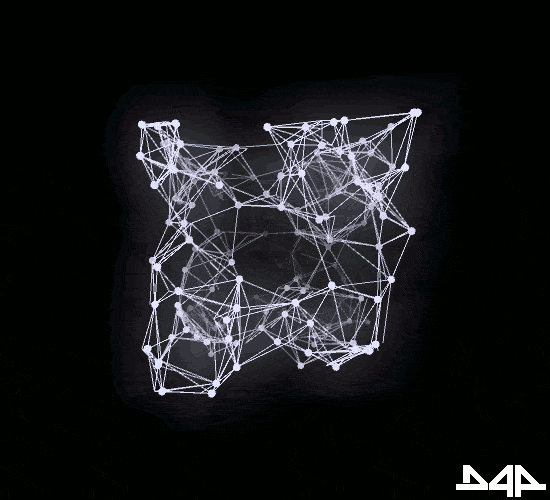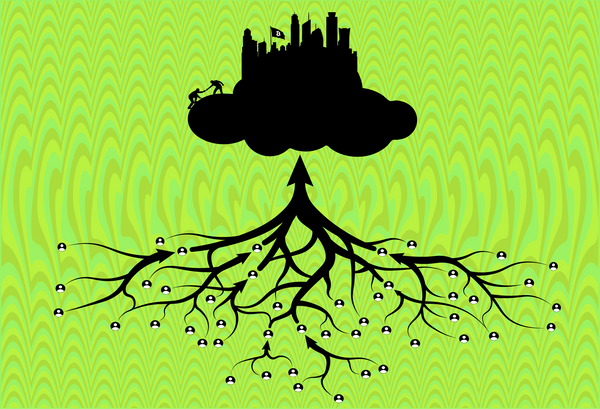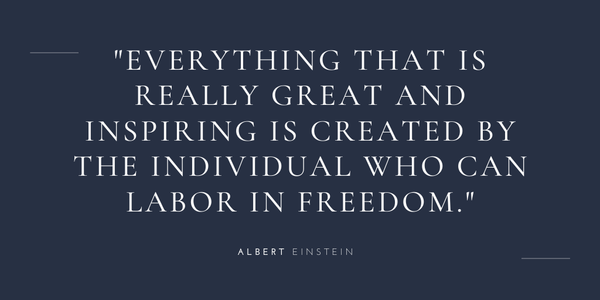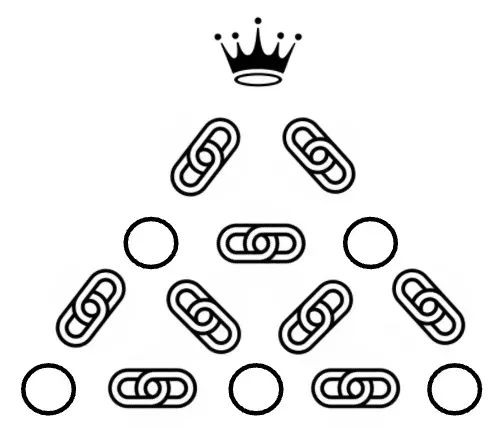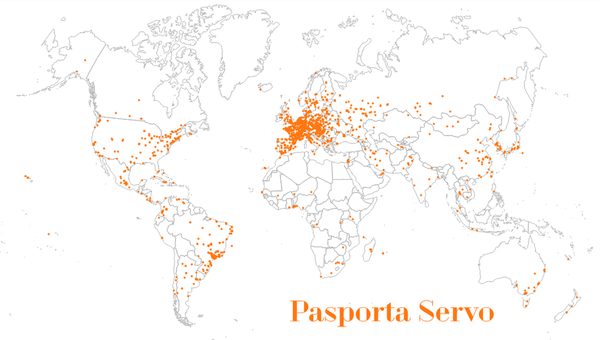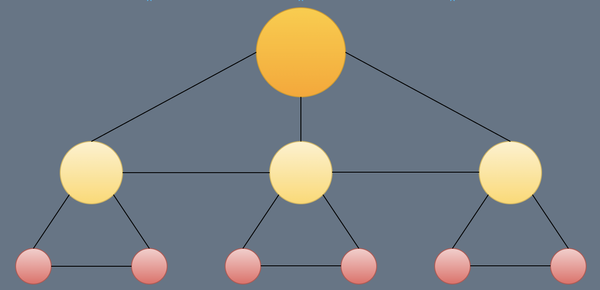The Network Union
The network union is the antecedent of the network state: a social network with a blockchain, a leader, and a purpose.
balajis
May 11, 2021 • 11 min read
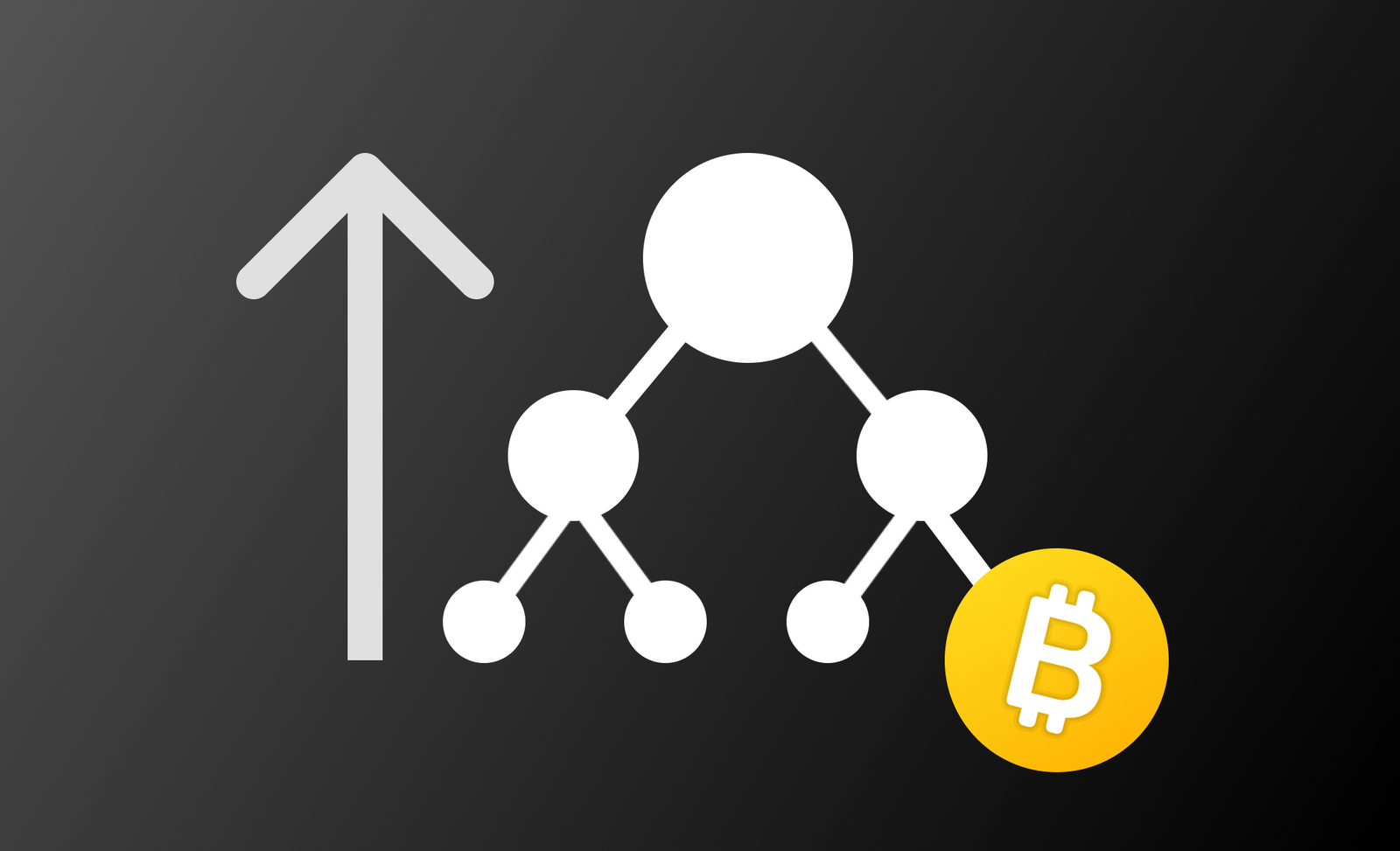
We know how to start new communities, new companies, and new currencies. But the process of founding new cities or countries may require new ideas.
Here, we describe an abstraction we call the network union, a social graph organized in a tree-like structure with a leader, a purpose, a crypto-based financial and messaging system, and a daily call-to-action.
The network union integrates concepts from traditional unions, startup corporate structures, Facebook groups, crypto tribes, DAOs, and UK-style shadow cabinets. On one level it's a straightforward integration of the new tools offered by blockchains with the existing functionality of social networks; on the other hand it's a way to go from an influencer posting online to a scaled community with digital bylaws, crowdfunding capability, a track record of collective bargaining on behalf of its members, and a numerically quantifiable level of social capital. It is thus an intermediate form between mere online communities and full-fledged network states.
Bowling Alone, But Posting Together
As motivation, the sociologist Robert Putnam observed 20 years ago that Americans were now bowling alone. The community organizations that had been the lifeblood of America for decades – religious groups, labor unions, veterans organizations, and fraternal clubs – were now largely defunct, replaced with an atomized society of strangers that lacked purpose, went bowling by themselves, and interacted with each other at scale mainly through the formal mechanisms of the state and the market.
The forces that caused this state of affairs are a topic for another day; one can blame the anomie of modernity on state regulation, market mechanisms, or both. But the forces that are quietly fixing this situation can be observed all around us: they are the organic groups that have been forming on the internet for the last twenty years, like subreddits, Facebook groups, Telegram channels, and online forums.
Right now these social networks are mainly used for idly sharing information: messaging, commiserating, recreating, sometimes raising awareness or signing petitions. But with blockchains we can power them up dramatically, with backlinks we can quantify their support base, and with the concept of a network union we can re-conceptualize their very purpose.
Blockchains Change Social Technology
The advent of mobile phones yielded new primitives that gave rise to new social networks. Ubiquitous internet-connected, location-tagged cameras in particular enabled services like Instagram, Snapchat, and TikTok.
Blockchains are similarly transformative for social networks, as they provide a series of new tools. Consider for example a new social network organized around something as simple as issuing an Ethereum-based ERC-20 token to every member. This gives:
- Tokens. Every user of this token-based social network receives tokens. Depending on the issuance policy, early users may get more than later users.
- Balances. Every user now has the ability to buy items and pay users with their token-based balance, an obvious functionality that does not exist on Facebook, Twitter, and LinkedIn.
- Crowdfunding. Every user can use their balance to crowdfund public goods on the site.
- Encryption. Every user has an Ethereum wallet public/private key pair, so they can digitally sign documents.
- Messaging. Every user can use their public/private key pair to send encrypted messages back and forth to each other.
- Partial Sovereignty. If the ERC-20 contract admin privileges are removed, or moved to a genuinely decentralized chain, tokens can't easily be seized by other parties. Users can't be deplatformed and community connections can't be broken by outside parties.
- Governance. The combination of the ability to communicate and transact allows for governance mechanisms with informational and financial components.
- Login. By hodling the token with something like a provable timelock, users can demonstrate that they are invested in the long-term health of the community. This can be used as a login criterion to access community-created services.
- Quantifiable Social Capital. The market cap of the token quantifies the value of being a member of the community.
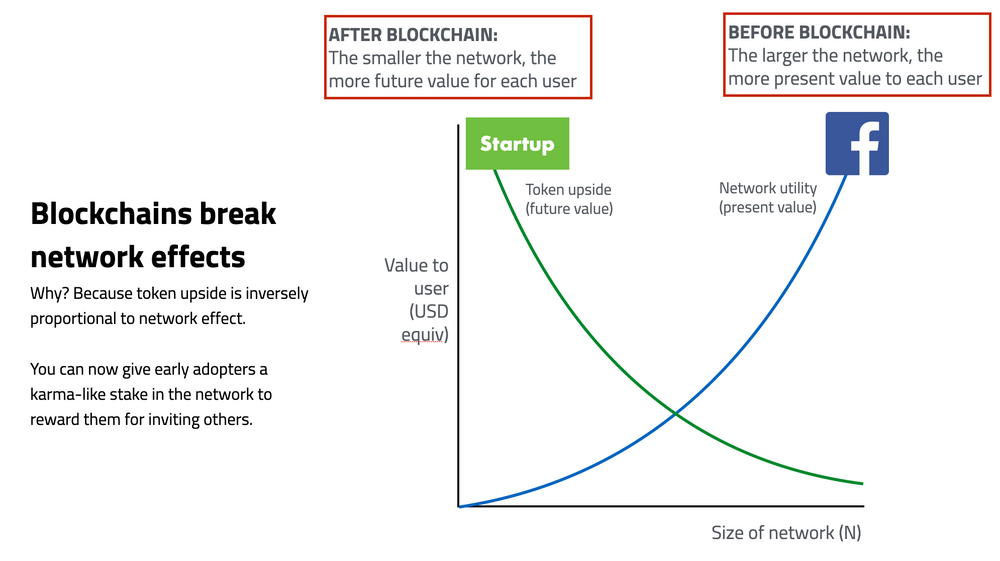
While people have written about these ideas for years, up to this point we haven't really had the on-chain capacity to integrate these kinds of functions with social network workloads. But because many scaling techniques are pure software, and coming online fast, token-based social networks will soon arise.
The social technology is thus now available to increase the seriousness of what you can do with a social network. But the other part is the social support.
Backlinks Quantify Social Support
A startup that achieves ambitious goals isn't staffed higgledy-piggledy from the population at large. It has a clear CEO, a flattish-but-hierarchical leadership structure, a definite culture, and an admission policy as selective as any university. This is very different from the entropic structure of social networks!
Put another way, there are significant gates on joining Facebook the company, and no gates whatsoever on joining Facebook the social network. To join Facebook the company, you need to pass a series of challenging interviews and then operate within an explicit hierarchy towards a leader-defined purpose. To join Facebook the social network you need only a pulse, and your purpose is entirely self-defined.
These couldn't be more different. But can we make them more similar? What would it look like to have something at the scale of Facebook-the-network, or even orders of magnitude smaller, that operated as effectively as Facebook-the-company?
One approach is to start thinking about social network structure in terms of backlinks, a concept popularized by search engines.[1] A backlink is an incoming link to a webpage. For a popular URL, like https://google.com, the number of incoming links is far in excess of the number of outbound links. But the quantity of backlinks is by no means the only thing that matters; the quality does as well.
Backlinks allow us to quantify a leader's support base. Every leader has individuals that support them. Some of those individuals in turn have other individuals supporting them. If we treat each expression of support as a backlink, if the asymmetric act of merely choosing to follow someone is turned into the asymmetric act of choosing to follow their direction, we can summon an immediate mental visual of a digital leader's support base. Without such a base of support a leader cannot lead. Their pronouncements will fall on deaf ears if they cannot acquire sufficient backlinks.
Heirs get backlinks all at once, founders build them over time
The process of backlink acquisition is quite different for the two kinds of leaders, founders and heirs.
The institutional heir typically gets their backlinks all at once. One day they don't have control of the fortune, or the position, or the institution. The next day they do. Now, to be fair, there can be incrementality in inheritance, if there is still a residual culture of paying one's dues and working your way up. But those dues are typically not paid to the customer, but to internal parties to gain political capital for the promotion. Once promoted, the jump in backlinks is fairly discontinuous. One day you are a private citizen, and the next you are governor of a state of millions of people.
By contrast, the technology founder gets their backlinks over time. Mark Zuckerberg did not get elected to run a three billion person social network with no prior executive experience. He started it in his dorm room, and convinced every single person in his support base to join him over a period of 15+ years. Some of them he recruited directly, but 99%+ of them joined him indirectly through the user interfaces his people designed. At every step of the way, if anyone questioned why this person was the CEO of Facebook the answer was clear: because he was the founder of Facebook.
Importantly, both of these paths to building support are considered legitimate. You can win an election, inherit an institution, and get all the backlinks at once. Or you can found something, build it up from scratch, and get the backlinks over time. Both are considered legitimate paths to becoming a leader. However, the founder's path has the crucial additional quality of selecting for competence. Remember: when COVID came the institutional heirs failed, but the technological founders succeeded.
From social graphs to social trees
There's one catch, though. The current quality of backlinks that founders generate when creating new companies, communities, and currencies is not sufficient for starting new cities and countries. One way to think about it is to note that it is considered legitimate for Mark Zuckerberg to give explicit direction to all fifty thousand Facebook employees, but not to all three billion Facebook users, even if he is in a sense the ultimate system administrator of the platform. The reason it's not considered legitimate is that Facebook users didn't sign that social (network) contract. They signed up for sharing photos with friends; they didn't sign up to start a new city or a new country.
But what if they did? What if we developed a new kind of social network, organized not as a social graph but a social tree, organized like a company hierarchy but at the scale of a city or state? Don't say that isn't possible, because founder-run Amazon scaled to 1.1 million employees, which already makes them bigger than dozens of UN member countries.
All of the people under Jeff Bezos are organized in a functional hierarchy under a single CEO, and all of them have explicitly opted into being there. This combines the competency of the startup with the legitimacy of the state, and gives us a taste of what's possible. The backlinks are like girders, forming a base of social support.
We want to be able to build something like that without having to first create a trillion dollar company and become one of the world's richest men. Where it gets interesting is to set up something that could get to Amazon's scale, but organized as a social tree – so you have a million people organized in a hierarchical structure for a common purpose outside of work.
The Network Union
What common purpose are people organizing for at that scale, if not work? The answer is that they are organizing to defend their interests as a sovereign collective, as a network union.
A network union is a global, mobile social network with an integrated blockchain and an explicit backlink structure, capable of collective bargaining with giant corporations and states alike. It is a check on the power of both concentrated capital and political capitols.
The integrated blockchain gives the network union access to the social technologies listed above: encrypted messaging, crowdfunding, governance, and the like. And the explicit backlink structure gives the network union a social support base with a clear leader, a concrete purpose, and an internal conflict resolution mechanism.
Social networks are entropic, network unions are directed
The combination is an enormous level up over existing social networks. The blockchain component provides economic alignment, and the backlink component provides ideological alignment. The leader provides clear direction, and the network union has an actual purpose. Compare this to the aimless dunking and entropic time-wasting on current social networks, and you'll see the difference.
Put another way, if we think about crowdfunding, mass migrations, and social media mobs, these are examples of people collectively voting with their wallet, feet, and voice respectively. Today that’s all disorganized. What a network union does is organize people directly, recruit them peer-to-peer, slot them into a social tree, and coordinate them with messaging apps and economic alignment for collective action.
The collective action of a network union
While network unions may participate in politics if laws permit, they prioritize daily action over occasional elections. Like a traditional union, they employ a series of escalating tactics to negotiate with entities of similar size and scale, like businesses and governments. But unlike a traditional union, their point of view on any given issue can be from the consumer, user, producer, or labor side rather than labor alone, depending on the role of their constituency.
One day the network union may bargain on behalf of the collective for cheaper bulk purchases of a high-volume staple like masks. The next day it could negotiate with a payments platform to reinstate a deplatformed member. And the next day it might find a job for a union member down on her luck. In general, if a corporation demonetizes you, unbanks you, deplatforms you, censors you, or otherwise harms you, a network union has your back. If a state doesn’t respect your group’s interests, a network union has your back too.
In addition to defense, a network union also takes positive action. It fields teams for e-sports. It organizes collective projects, like shared wikis and open source projects. And it may crowdfund the startup of a union member in good standing – while taking a cut for the network union itself, using its integrated blockchain for both purposes. It is the job of the network union leader to organize these regular calls-to-action, distributed in the (encrypted, blockchain-mediated) news feed for network union members.
The network union is thus a much more purposeful and organized online community than a social network, but it can also be founded and scaled to millions of people from a laptop. It is this kind of structure that will let us move from simply inheriting cities and countries to founding them from scratch, from bowling alone to building together.
✅ Task: Earn $100 in BTC
Write a review of this post, with figures if possible
Write a review of this post on your social media page or (ideally) at your own domain. You can offer feedback, correct errors, or propose extensions; we ask only that you be constructive. We'll award up to ten $100 prizes to the best ten reviews. When writing your review, feel free to consult previous articles in the Network State series.
In order to stand out, see if you can include figures or illustrations of concepts like backlink structures, network unions, startup cities, and network states.

Winners: Best Reviews
The following ten submissions received $100 in Bitcoin for their written reviews of this post. Recommended reading!
1 Of course, social networks have been conscious of the distinction between asymmetric and symmetric links for 15 years as well. Twitter is default asymmetric (you can follow someone without them following you back), while Facebook and LinkedIn are default symmetric (friending is reciprocal and double opt-in). These signals are used in social feed ranking and many other places. Still, the term backlink is evocative, which is why we use it.15 Comments
Comments are for members only.
Please subscribe or sign in to join the conversation!
The backlink concept reminds me of liquid democracy. I think the possibility of blockchain could be used in such an instance to create collective bargaining power whilst still maintaining individuality and no tyranny of the majority.
I find the network union concept super interesting. Currently putting together a hacker house: https://makershouse.xyz/ and noticing a trend of others wanting to do the same. Wouldn't it be awesome if there could be a wider, decentralised community of different houses and people?
This is a paradigm shift. Would love to see if everyone who has responded to the Network State series could engage in frequent discourse and collaborate online on an MVP "network union".
Interested!
Hey Jim & Finn!
A few of us (shout-out @Joel, @Camellia & co.) who have been chatting in the comments in various tasks are putting together a discord to make it easier to connect, share ideas and collaborate!
Feel free to join here: http://discord.gg/9tbhS4J4xa (and anyone else passionate about ideas & projects around building a brighter future with tech are definitely welcome)
Moderators: if this is not allowed feel free to remove it
Hey chance!
I tried joining the Discord server above, says 'Invite Invalid'.
I've also been following the 'Network State' series, and would love to be a part of these conversations and actions.
I see you got in Kriti :)
I double checked the URL and it seems to work, but if anyone has any issues feel free to reach out to me on twitter: https://twitter.com/chancecollabs
Our Response Here: http://revolutionandideology.com/the-network-union-a-response
Great post! Check out our response & illustrations https://www.chilipixels.io/posts/the-network-union
I posted an answer at https://nicodeva.substack.com/p/cloud-unions.
Network unions are all about building a full fledged social network with political and economical features, and eventually enough clout that it can start discussing with large actors on a more equal basis.
We've seen that crypto projects fared the best when built in a pretty centralized fashion early on, before opening governance more and more. However some research about governance early on is necessary as it will become the core of a network union.
Very thought provoking. I wrote a response here https://backbounce.substack.com/p/the-network-union-the-dao-state?r=4hwxw&utm_campaign=post&utm_medium=web&utm_source=copy Have some thoughts about working on the physical land part of the network, even though thats clearly going to have to come later. Hit me up if you want to chat about it.
Amazing series of article! I wrote a response and a historical perspective on the concept here: https://adssx.substack.com/p/a-brief-history-of-cloud-countries Would love to get feedback :)
